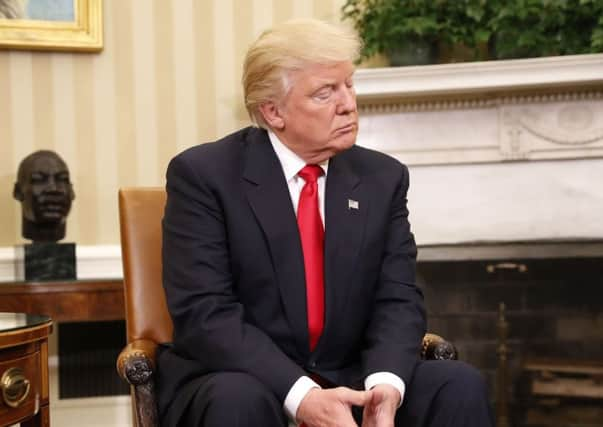Andrew Vine: Time to grit our teeth and make friends with Trump


Whether acknowledged or not, the spectre of the 45th President-elect of the United States looms over the proceedings, as it now does at every stage of the Brexit process.
Our timescale for leaving the EU is going to be spanned by Donald Trump’s presidency, and his influence on the world’s economy is central to whether we prosper or not.
Advertisement
Hide AdAdvertisement
Hide AdAbhorred as he is by countless millions around the world, as well as in his own country, and extremely questionable though his fitness is for the most powerful job on the planet, Theresa May and her Ministers are going to have to look him in the eye, smile and try to make him a friend.
Those smiles will probably have a forced quality to them, but all the same, at some point Mr Trump needs to be wooed and flattered with all the pomp and ceremony that Britain can muster, with the red carpet rolled out at Buckingham Palace for a state banquet in his honour.
The world is stuck with him for the next four years, like it or not, and naked self-interest dictates that a Britain faced with the uncertainties of Brexit needs to wring the maximum advantage from it.
The principal reason for befriending him is that Mr Trump will preside over an economy worth 18 trillion dollars from January – far bigger than the EU, over which so much angst has been expended, with a lot more yet to come.
Advertisement
Hide AdAdvertisement
Hide AdThere is no more tempting market with which to establish links as a newly-independent trading nation freed from the shackles of collective EU bargaining.
Whatever else emerged about the soon-to-be president in the rancorous US election – much of it unpalatable – the aspect of his personality that needs to be cultivated is his businessman’s appetite for doing deals.
Post-Brexit, Britain’s ability to make deals is key to the future, and explicitly stated or not, doing them with the US will surely be at the forefront of the minds of the select committee’s members tomorrow.
If Britain is to win Mr Trump’s confidence as a trading partner, we must demonstrate that we understand the populism and disillusionment with conventional politics that swept him to power. The forces at work in America were very similar to those that produced a majority for leaving the EU in June’s referendum.
Advertisement
Hide AdAdvertisement
Hide AdA working class frustrated at seeing their jobs exported to Third World countries and leaders apparently unwilling or unable to control immigration are common to both results.
But there’s a difference. The US demonstrated a growing tendency in western democracies to put their faith in an old-fashioned, authoritarian “strong man” who condemns the status quo and is aggressively nationalist.
The same sentiments are to be seen in Hungary and Turkey, both with hard-line leaders, and there are looming challenges from similar figures in both France and Holland.
In Europe, they are the product of impatience, and even anger, with a high-handed and out-of-touch EU, which dictates to member states and remains obstinately resistant to reform even after the seismic shock of the Brexit vote.
Advertisement
Hide AdAdvertisement
Hide AdBut if the EU hierarchy are doing their best to shrug off Britain’s decision, they surely cannot ignore the implications of Mr Trump’s election.
The bloated, self-righteous and arrogant bureaucracy fuelling discontent amongst the electorates of member states is exactly the sort of government that Mr Trump railed against and prompted tens of millions to vote for him. This wave of populism bodes well for Britain as it prepares to map out an economic future.
We have no desire for authoritarian leadership, but we do have a chance to be a moderating influence on nationalist sentiment both in the US and in Europe, whilst demonstrating that our understanding of the desire to be free and independent makes us an ideal trading partner.
The Government should not have any qualms about exploiting EU nervousness about Mr Trump and the grassroots discontent he symbolises in order to lever a new relationship with Europe.
Advertisement
Hide AdAdvertisement
Hide AdIt is perfectly possible that Mr Trump’s instinct will be to do deals with a strong, independent Britain in preference to entering protracted negotiations with a weak and divided EU, especially after seeing a trade agreement with Canada almost scuppered by the opposition of a single region of Belgium.
The EU may conclude it needs as many friends as possible in dealing with a hard-nosed, business-minded US president, and with that in mind allow itself to be pushed into a better deal with Britain.
One of our key international roles has long been to act as a bridge between Europe and the US. In this unfamiliar new age of international politics and leadership style, we can not only maintain this role, but turn it to our advantage.
E